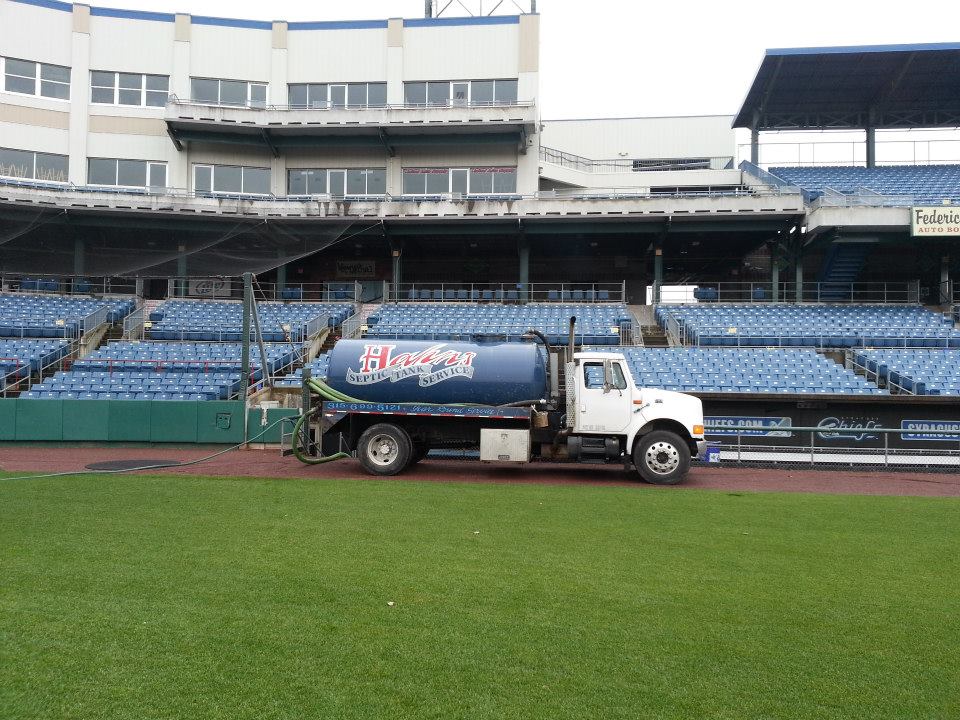
SErvices
At Hahn's Septic Service we cover all aspects of drainage. Whether you have residential waste going to the public sewer system or your own septic system; you have any of the many varieties of waste options that face the commercial world. Hahn's Septic has the equipment and knowledge to handle the project at hand.
Pumping a Grease Trap at a local University
Pumping
We have multiple trucks that spend their days pumping Septic Tanks, Grease Traps, and various other pits. They are piloted by professional and knowledgeable technicians that can answer any questions you may have.
Drain Snake and Inspection Cameras
Drain cleaning/Jetting
Things flowing slowly? You're one call away from getting your drains back on track. We have snakes of all sizes to tackle any drain your house, restaurant, or complex.
Jetting Large Diameter Overflow Pipe
Commercial Services
Commercial Kitchens, Restrooms and Large Drainage Pipes offer plenty of opportunities to see abuse and clogs. We have the equipment and experience to take care it all.
Install
Hahn's not only services existing drain lines and systems, we remove old lines and systems and install new.
Grease traps
Restaurants and commercial kitchens are required to have a grease separator before kitchen waste ties to sanitary waste lines. They are county spec'd and we install all types and sizes of separators.
septic tanks
If you're building a new home, or it's time to swap that old collapsing tank in your back yard; we're here for you.
leach fields
Your tank is only part of the system. We offer and install all types drainage solutions. Drywells, Leach Fields, and even landscape drainage.
Contact Us
The fastest way to get ahold of us is to dial 315 699 5121. If you prefer to email us simply fill in the text boxes and hit submit.
Frequently Asked Questions
How long do septic systems last?
Septic systems are designed to provide long-term, effective treatment of household waste when operated and maintained properly. However, most systems that fail prematurely are due to improper maintenance. Less serious problems are usually with plumbing (such as pipe blockages from tree roots growing into the pipe). Sometimes, the septic tank, although durable, can deteriorate or have other structural problems. The most serious problems are the result of a clogged drainfield. Unfortunately, this is the most expensive to repair. Once the absorption field is clogged, it must be replaced and can cost thousands of dollars.
How often should I pump my septic tank?
How often you need to pump depends on the size of the tank, the number of people in the household, and the amount and type of solids. Generally, a septic tank should be pumped every 3 to 5 years, however, some alternative systems that are more complex may need pumping more frequently. If you are unsure if your tank needs pumping, have it inspected and get a recommendation for how many years you can go between pumping. Write this schedule down on a maintenance chart or where you keep your maintenance records.
What should not be flushed down the toilet?
Flush only human waste and toilet paper down the toilet — avoid flushing dental floss, cat litter (including "flushable" varieties), hair, Kleenex, cigarette butts, cotton swabs, feminine hygiene products, condoms, paper towels, static cling sheets, diapers, and disposable wipes.
How much will it cost to pump my tank?
Pumping can cost from $375 and up. Because prices vary based the tank access lids being exposed and location of the tank. NOTE: An average tank contains 1000 gallons.
Will additives help my system?
Adding a stimulator or an enhancer like Rid-x or yeast to a septic tank to help it function or "to restore bacterial balance" is not necessary. The naturally occurring bacteria needed for the septic system to work are already present in human feces. According to the U.S. Department of Health, none of these products eliminate the need for routine maintenance and pumping.






